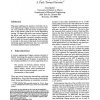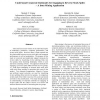896 search results - page 3 / 180 » On completeness of word reversing |
ICSE
1995
IEEE-ACM
13 years 9 months ago
1995
IEEE-ACM
This paper addresses the question of whether the reverse engineering of legacy systems is doomed to failure. Our position is that the answer is highly dependent on the specific go...
HICSS
2005
IEEE
13 years 11 months ago
2005
IEEE
There has been much written on the individual topics of bankruptcy prediction, corporate performance, and reverse stock splits. However, there is little research into the relation...
WCRE
2003
IEEE
13 years 11 months ago
2003
IEEE
The process of software reverse engineering commonly uses an extractor, which parses source code and extracts facts about the code. The level of detail in these facts varies from ...
LREC
2008
13 years 7 months ago
2008
This paper proposes a new method of the sentiment analysis utilizing inter-sentence structures especially for coping with reversal phenomenon of word polarity such as quotation of...
SOFSEM
2012
Springer
12 years 1 months ago
2012
Springer
Abstract. Iterated hairpin completion is an operation on formal languages that is inspired by the hairpin formation in DNA biochemistry. Iterated hairpin completion of a word (or m...


